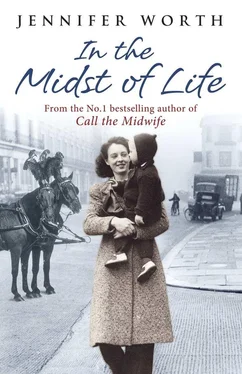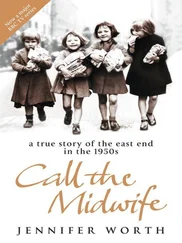Jennifer Worth - In the Midst of Life
Здесь есть возможность читать онлайн «Jennifer Worth - In the Midst of Life» весь текст электронной книги совершенно бесплатно (целиком полную версию без сокращений). В некоторых случаях можно слушать аудио, скачать через торрент в формате fb2 и присутствует краткое содержание. Жанр: Биографии и Мемуары, на английском языке. Описание произведения, (предисловие) а так же отзывы посетителей доступны на портале библиотеки ЛибКат.
- Название:In the Midst of Life
- Автор:
- Жанр:
- Год:неизвестен
- ISBN:нет данных
- Рейтинг книги:3 / 5. Голосов: 1
-
Избранное:Добавить в избранное
- Отзывы:
-
Ваша оценка:
- 60
- 1
- 2
- 3
- 4
- 5
In the Midst of Life: краткое содержание, описание и аннотация
Предлагаем к чтению аннотацию, описание, краткое содержание или предисловие (зависит от того, что написал сам автор книги «In the Midst of Life»). Если вы не нашли необходимую информацию о книге — напишите в комментариях, мы постараемся отыскать её.
In the Midst of Life — читать онлайн бесплатно полную книгу (весь текст) целиком
Ниже представлен текст книги, разбитый по страницам. Система сохранения места последней прочитанной страницы, позволяет с удобством читать онлайн бесплатно книгу «In the Midst of Life», без необходимости каждый раз заново искать на чём Вы остановились. Поставьте закладку, и сможете в любой момент перейти на страницу, на которой закончили чтение.
Интервал:
Закладка:
She chuckled again, and her face creased with merriment.
‘Does a man need porridge or scrambled eggs when he come to the Pearly Gates? No way. He need a clean mind and a pure heart.’
I laughed with her, and said that it was hospital practice to feed patients, even to the point of force-feeding.
Her merriment vanished. ‘You not goin’ to force-feed my husband,’ she said emphatically.
‘We will not try to feed your husband any more, I assure you. But what about drinking?’ I asked.
‘I give him water, it trickle out his mouth. A nurse give him water, he try to swallow, but the water, it choke him. Does he need water, Sister?’
I said we all need water to live.
‘But he is dying, not living. It is different.’
I said that if he had no water his death would come more quickly.
‘But does that matter?’ she asked innocently.
I had to pause. What a question! Does it matter? I had asked myself that question many times but never dared to voice it. Hearing the words spoken aloud by this woman was a shock. Do we try too hard to keep people alive? And what are we doing it for?
I said, ‘I cannot allow a patient on my ward to die of thirst. It is against all my teaching, principles and practice.’
Yes, Sister, I understand you,’ she said quietly.
‘If he has no water his kidneys will make less urine, and there will be more blood and infection in what little urine is in his bladder. It will be very bad for him.’
‘I understand,’ she said.
‘We planned to put up a drip today.’
She jerked up and looked me straight in the eye. ‘No. No drip.’
‘Why? Does your religion forbid it?’
No. We are Methodists, not Fundamentalists. I don’t think it is forbidden. It just seems wrong, unnatural.’ Her face dissolved in tenderness. ‘He is at the point of death, Sister. He is a good man, and has led a good life. Let him rest in peace.’
I said I would discuss the matter again with the doctor. But I also said that, as he could take very little fluid by mouth, it was important to keep his mouth and throat clean and moist, and that one of the nurses would show her how to do this with swab sticks and moistening solution.
After that conversation, his wife never left him. The family, varying at different times between eight and twenty people, more or less camped downstairs, but Mrs Roberts strictly controlled the number of people who saw him. We put him into a single room, and no drip was installed. The family was assiduous in keeping his mouth and throat moistened, and he took a few ounces of water now and then. Some of the younger members of the family helped the nurses to clean and change his bed, and to attend to pressure points. They liked doing so, and almost fought for the privilege.
The family brought food for Mrs Roberts, and we provided cups of tea and coffee from the ward kitchen, for which she always thanked us most graciously.
It was a busy morning, and she carried her empty cup into the kitchen, saying, ‘I see you are busy, I do not need to trouble you to collect my empty cup,’ and she put it on the draining board.
When she got back her husband was dead.
It happens this way, time and again. So many people will say something like, ‘I only went to answer a knock at the door, and when I came back she was gone,’ or, ‘I just went to the window to draw back the curtains and look down at the garden, and when I turned round, he was dead.’
Why does the person so often die during the minute or two when the watcher is absent? There must be a reason. It happens this way far too frequently to be a coincidence. Dying is not passive. Dying is not something that happens to you without your knowledge or control. Dying is an active process, in which the soul is the leading actor.
There is more, much more, to human life than mere flesh and blood, bones and brains. There is a living spirit that is the spark of life, and when it knows that the flesh, which it has animated for a while, is decaying, the soul wants to slip away quietly, when no one is looking.
FORGET-ME-NOTS
‘Show us your wedding ring, Sister.’
I held out my hand for the ladies in the day room to admire.
‘It’s lovely, dear. You look after it, and your man. Keep them special.’
‘What’s he like, Sister? Tell us about him.’
They crowded round, the female interest in love and marriage alive in the face of death. I had brought the photo album of our wedding for the ladies to see.
‘He looks nice,’ said one.
‘You can’t trust men,’ said another.
‘Oh, don’t be a sourpuss. There’s good and bad everywhere, and I’m sure Sister’s chosen a good one.’
‘Mine broke my arm for me.’
‘Mine could never stop. Fifteen pregnancies I had. Even on his deathbed he was after it. He’s gone now, good riddance. I’ll bet he’ll ask the angels for it.’
A burst of laughter among the women. I loved them all, and was glad to see they still retained their sense of humour. We nurses were always told that we should keep alive an interest in life, tell the patients about our days off, our interests, families, boyfriends and the dances we went to. I even encouraged nurses to flirt with the men – anything to divert their minds. Cancer patients often feel surprisingly well, in spite of the malignancy, and keeping up hope was an important part of our work.
I tried to tell them about my young husband.
‘He’s very clever. He’s a schoolmaster.’
‘Oh, fancy that. A schoolteacher, eh? That’s nice. Did you hear that, dear? Sister’s new hubby’s a school teacher.’
‘Uh?’
‘A schoolteacher, dear, Sister’s new hubby. Oh, she’s not with us, poor soul. It’s a shame.’
‘What’s he look like? Tell us.’
‘He’s tall and good looking, very distinguished,’ I said.
‘Ooh, that’s nice,’ from the cheerful one.
‘Handsome is as handsome does,’ from the sourpuss.
‘Blue eyes or dark?’
‘Blue.’
Little Mrs Merton looked up wistfully. She had not spoken, but had been twisting her wedding ring round and round her finger. She was very small, and had a childlike quality that you sometimes meet in the very old. Her eyes were particularly appealing. They revealed patience, kindness and sadness, but also humour. We knew she had a sarcoma that was consuming her bones, but she thought the pain was due to rheumatism, and we let her think this.
‘My Bert’s eyes were blue,’ she said, ‘forget-me-not blue. He was a lovely lad, my Bert, no one like him. Before he went, I gave him a little picture. It was a woodland scene of forget-me-nots growing under chestnut trees. He always said my hair was chestnut brown, so it was like a little picture of us both, you see.’
‘That’s nice.’
‘That’s pretty.’
‘What a nice idea,’ the ladies chorused.
Mrs Merton looked pleased and flattered.
‘I thought so, and so did he. He took it with him when he went off to the Great War. I’ve got his likeness here. You can look at it. I’m that proud of it.’
She took a locket from around her neck, and opened a small silver clasp.
‘That’s my Bert.’
She handed it around lovingly. Boyish features with smiling eyes looked out at us.
‘He was such a lovely lad, always laughing, always happy, proud of his uniform – oh, I can mind him now, marching off.’
She smiled as she took the locket back and hung it around her neck. ‘I’m never parted from these – my wedding ring, and the likeness of my lovely lad. He was nineteen when we were married in 1915, and two months later he marched off to the war. Oh, I can mind him still, waving and smiling, and marching off.’
Читать дальшеИнтервал:
Закладка:
Похожие книги на «In the Midst of Life»
Представляем Вашему вниманию похожие книги на «In the Midst of Life» списком для выбора. Мы отобрали схожую по названию и смыслу литературу в надежде предоставить читателям больше вариантов отыскать новые, интересные, ещё непрочитанные произведения.
Обсуждение, отзывы о книге «In the Midst of Life» и просто собственные мнения читателей. Оставьте ваши комментарии, напишите, что Вы думаете о произведении, его смысле или главных героях. Укажите что конкретно понравилось, а что нет, и почему Вы так считаете.












